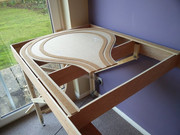I have been laying track

Made lots of mistakes, but I am learning a few tricks of the trade. In particular:
1) Gluing is better than pinning
2) Smooth curves are better than tight ones
3) It is all about marking and following a centreline.
4) Map pins are the perfect size for holding (n-gauge) track in place while the glue goes off.
5) Peco Code 55 track has the rail embedded in the sleepers which makes it much more stable, but also much harder to work with.
Here are some videos of my progress:
Track Laying:
https://youtu.be/DcTvliXCmTI
A technique for joining track on tight curves.
https://youtu.be/0odv2Ax8anA
Do offer me advice, and let me know what I am doing wrong.

